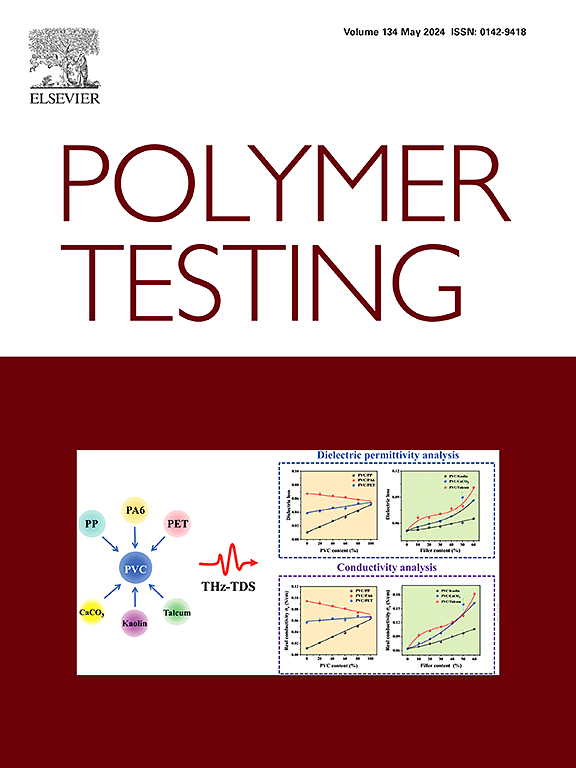Advancing polypropylene quantification in recycled HDPE: A comparative study of FTIR, DSC, TREF, and TGIC for enhanced plastic circularity
IF 5
2区 材料科学
Q1 MATERIALS SCIENCE, CHARACTERIZATION & TESTING
引用次数: 0
Abstract
The exponential growth in the production and demand for plastic materials has given rise to significant environmental concerns, highlighting the need for effective recycling strategies to reduce plastic waste and give these materials a new life. Nevertheless, recycling plastic materials present a significant challenge. For instance, even trace amounts of polypropylene (PP) in recycled high-density polyethylene (HDPE) can significantly affect its physical, chemical, and mechanical properties. It is therefore imperative to precisely determine the levels of PP contamination, which is the principal objective of this study, to ensure the quality of recycled materials and compliance with regulatory standards in a range of countries. An alternative analytical technique based on a chromatographic method involving the adsorption of the polymer chains in a support, namely Temperature Gradient Interaction Chromatography (TGIC) is evaluated. To ascertain the efficacy of the proposed method, it has been benchmarked against other established techniques within the recycling industry, such as Fourier Transform Infrared Spectroscopy (FTIR) and Differential Scanning Calorimetry (DSC) as well as recently published alternative method, Temperature Rising Elution Fractionation (TREF). This study offers an examination of the advantages and challenges associated with each of these techniques, with the objective of facilitating the selection of an optimal PP quantification method in recycled PE that can enhance the sustainability and quality control of recycled materials.
推进HDPE中聚丙烯的量化:FTIR、DSC、TREF和TGIC对增强塑料循环度的比较研究
塑料材料的生产和需求呈指数级增长,引起了重大的环境问题,强调需要有效的回收战略,以减少塑料废物,并赋予这些材料新的生命。然而,回收塑料材料提出了一个重大挑战。例如,即使是回收高密度聚乙烯(HDPE)中微量的聚丙烯(PP)也会显著影响其物理、化学和机械性能。因此,必须精确确定PP污染水平,这是本研究的主要目标,以确保回收材料的质量并符合一系列国家的监管标准。另一种分析技术基于色谱法,涉及聚合物链在载体中的吸附,即温度梯度相互作用色谱(TGIC)进行了评估。为了确定所提出的方法的有效性,它已经与回收行业中的其他既定技术进行了基准测试,例如傅里叶变换红外光谱(FTIR)和差示扫描量热法(DSC),以及最近发表的替代方法,升温洗脱分馏(TREF)。本研究考察了与每种技术相关的优势和挑战,目的是促进在再生PE中选择最佳PP量化方法,从而提高再生材料的可持续性和质量控制。
本文章由计算机程序翻译,如有差异,请以英文原文为准。
求助全文
约1分钟内获得全文
求助全文
来源期刊

Polymer Testing
工程技术-材料科学:表征与测试
CiteScore
10.70
自引率
5.90%
发文量
328
审稿时长
44 days
期刊介绍:
Polymer Testing focuses on the testing, analysis and characterization of polymer materials, including both synthetic and natural or biobased polymers. Novel testing methods and the testing of novel polymeric materials in bulk, solution and dispersion is covered. In addition, we welcome the submission of the testing of polymeric materials for a wide range of applications and industrial products as well as nanoscale characterization.
The scope includes but is not limited to the following main topics:
Novel testing methods and Chemical analysis
• mechanical, thermal, electrical, chemical, imaging, spectroscopy, scattering and rheology
Physical properties and behaviour of novel polymer systems
• nanoscale properties, morphology, transport properties
Degradation and recycling of polymeric materials when combined with novel testing or characterization methods
• degradation, biodegradation, ageing and fire retardancy
Modelling and Simulation work will be only considered when it is linked to new or previously published experimental results.
 求助内容:
求助内容: 应助结果提醒方式:
应助结果提醒方式:


